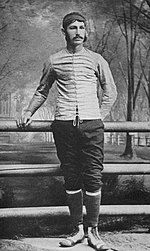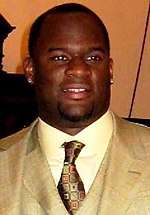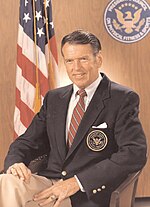Portal:American football/Selected biography/2008
January, 2008
Walter Chauncey Camp was a sports writer and football coach known as the "Father of American Football". Along with John Heisman, Amos Alonzo Stagg, Glenn Scobey Warner, and George Halas, Camp was one of the most significant people in the history of American football.
Camp was born in the city of New Britain, Connecticut, the son of Leverett L. and Ellen Cornwell Camp. He attended Hopkins Grammar School in New Haven, entered Yale College in 1876 and was graduated in 1880. At Yale he was a member of Delta Kappa Epsilon fraternity.
By the age of thirty-three, a scant twelve years after graduating from Yale, Walter Camp had already become known as the "Father of American Football". In a column in the popular magazine Harper's Weekly, sports columnist Caspar Whitney had applied the nickname; the sobriquet was appropriate because, by 1892, Camp had almost single-handedly fashioned the game of modern American football.
For almost 50 years, Camp served on the various collegiate football rules committees that developed the game of football during that time. His opinions, especially in his early years, dominated the sessions. Camp's contributions to early football included the introduction of the scrimmage in place of the rugby union scrum, the reduction of the number of players to eleven, the forward pass, a system of downs for advancing the ball (3 downs to make 5 yards, later amended to 4 downs for 10 yards in 1912), and the introduction of the now standard offensive arrangement of players (a seven-man offensive line and a four-man backfield consisting of a quarterback, two halfbacks, and a fullback). Camp was also responsible for introducing the "safety", the awarding of two points to the defensive side for tackling a ball carrier in his own "end zone". This is significant as rugby union has no point value award for this action. But, as in rugby union, a free kick by the offense from its own 20-yard line (to change possession) occurs immediately following a safety. But Camp knew that developing the game was not enough; in order for it to catch on, the word had to spread.
(more)
February, 2008
Vince Young is an award-winning American football player. A dual-threat quarterback, Young is the current starting quarterback for the National Football League Tennessee Titans. Young played college football for the University of Texas Longhorns before turning professional. As a college junior, Young was one of the three finalists for the Heisman Trophy, finishing second to Reggie Bush. Following the Heisman voting, Young led his team to a BCS National Championship in a classic thriller against the defending BCS national champion University of Southern California Trojans in the 2006 Rose Bowl. The game featured two Heisman Trophy winners as Young's opponents: both USC quarterback Matt Leinart and USC running back Reggie Bush. The game was called one of the most-anticipated games in the history of college football. In 2006, ESPN named Young as the 10th best college football player of all time. Following the season, Young decided he would forgo his last year of NCAA college eligibility and become a professional player by entering the 2006 NFL Draft, earning the No. 3 overall pick. In his rookie season, Young was named the NFL Offensive Rookie of the Year and earned a roster spot on the AFC Pro Bowl team.
(more)
March, 2008
Tony Dungy is a former professional American football player and the current head coach of the Indianapolis Colts of the National Football League. Prior to that, between 1996 and 2001, he was the head coach of the Tampa Bay Buccaneers. He became the first African American head coach to win the Super Bowl when his Colts defeated the Chicago Bears on February 4, 2007.
Following a college football career with the Minnesoa under coach Cal Stoll in which Dungy left as the school's career leader in pass attempts (576), completions (274), touchdown passes (25), and passing yards (3,577), Dungy was signed as a free agent by the Pittsburgh Steelers of the National Football League as a defensive back. He played for the Steelers in 1977 and the Super Bowl champion 1978 seasons, leading the team in interceptions in the latter campaign. In 1979 Dungy was traded to the San Francisco 49ers, then finished his career a year later in the training camp of the New York Giants in 1980.
Following his retirement, Dungy was invited to become an assistant coach for his alma mater, the University of Minnesota in 1980. After one season in charge of defensive backs, he was asked to come back to the NFL as a coach. He was hired as an assistant coach with the Steelers by Chuck Noll, his former coach, in 1981.
In 1982, he was named defensive backfield coach, and was promoted in 1984 to defensive coordinator. He left the Steelers in 1989 to become the defensive backs coach for the Kansas City Chiefs, and took over the defensive coordinator position for the Minnesota Vikings under Dennis Green in 1992. While at Minnesota, Dungy's defense was ranked first in the NFL. Dungy achieved his dream of being an NFL head coach when he was hired by Rich McKay to reform the Tampa Bay Buccaneers, a team well-known for its lack of success, on January 22, 1996.
(more)
April, 2008
Troy Aikman is a former American football quarterback for the Dallas Cowboys of the National Football League, and currently a television sportscaster for the Fox network. He is also a joint owner of the NASCAR Nextel Cup racing team, Hall of Fame Racing, along with fellow former Cowboys quarterback, Roger Staubach. He is the among the best NFL quarterbacks of all time, and was elected to the Pro Football Hall of Fame in 2006. He is referred to as one of "The Triplets" with Cowboys teammates Michael Irvin and Emmitt Smith.
Aikman was the projected No. 1 overall pick in the 1989 NFL Draft, held by the Cowboys. The franchise had fallen on hard times, going a woeful 3-13 in 1988. On February 25, 1989, new owner Jerry Jones shocked the sports world by firing the beloved Tom Landry—the only head coach the Cowboys ever had—and replacing him with Jimmy Johnson, who, to no one's surprise, took Aikman in the draft. A few months later, in the NFL's supplemental draft, Johnson surprisingly selected quarterback Steve Walsh, who had played for Johnson (and most of the new Cowboys' coaching staff) the previous two years at the University of Miami (going 23-1 as a starter and winning a national championship). However, Aikman won the job over Walsh in training camp and never relinquished it (although Walsh played while Aikman was injured). Walsh was traded early in the 1990 season.
Johnson did not develop Aikman slowly but instead threw him into action immediately. Meanwhile, Johnson spent the entire season shuffling the depth chart trying to find players talented enough to build a winning team. As a result, Aikman was constantly trying to adjust to the styles of different players. Then, in middle of the season, the team's only Pro Bowl player, running back Herschel Walker, was traded for several veteran players and draft choices. Although the trade turned out to be successful in the long run, it was devastating to the team in the 1989 season.
(more)
May, 2008
George Allen was an American football coach in the NFL and USFL.
Allen was born in Detroit, Michigan, where his father, Earl Raymond Allen, was recorded in the 1920 and 1930 U.S. census records for Wayne County, Michigan as working as a chauffeur to a private family. He earned varsity letters in football, track and basketball at Lake Shore High School.
Allen went to Alma College and later at Marquette University, where he was sent as an officer trainee in the U.S. Navy's World War II V-12 program. He graduated with a B.S. in education from Eastern Michigan University.He attended the University of Michigan where he earned his M.S. in Physical Education in 1947.
In 1948, Allen became coach to Morningside College in Iowa. Over three years, he compiled a 15-2-2 record. From 1951 through 1956, he coached Whittier College in California where he put together a 32-22-5 mark.
Allen joined the Los Angeles Rams staff in 1957, coaching under fellow Hall of Fame coach Sid Gillman. In 1958, owner and head coach George Halas hired him as both personnel director and assistant coach with the Chicago Bears. During his seven years of acquiring talent, the Bears were able to select three future Pro Football Hall of Famers in Mike Ditka, Dick Butkus, and Gale Sayers. Allen's defensive schemes and tactics also had a formative effect on future Hall of Fame players Bill George and Doug Atkins during their most productive years. However, it would be his innovative defensive philosophies that would allow Allen to make his mark in the NFL.
During the latter stages of the 1962 NFL season, Allen became the Bears' defensive coordinator following the resignation of Clark Shaughnessy. In his first full year in the position, Allen helped the team's defense dethrone the two-time champion Green Bay Packers and lead the team to the 1963 NFL Championship. Following the 14-10 victory on December 29 over the New York Giants, played under frigid conditions at Wrigley Field, Allen received a rare honor when he was presented with the game ball following the contest.
(more)
June, 2008
Marshall William Faulk (born February 26, 1973 in New Orleans, Louisiana) is a former football player in the National Football League. He is currently an analyst for NFL Total Access on the NFL Network. He played football in college for San Diego State University, before being drafted second overall by the Indianapolis Colts in the 1994 NFL Draft. Following the 1998 season Faulk was traded to the St. Louis Rams. Marshall is one of the few players to reach at least 10,000 rushing yards and 5,000 receiving yards in his career. His seven two-point conversions are an NFL record. Marshall Faulk is the only player to have 100+ rushing touchdowns and 30+ receiving touchdowns. Due to a knee injury, Faulk did not play in the 2006 season. During the season he became an analyst for the NFL Network. Faulk announced on March 26, 2007 that he had officially retired from football at the annual NFL Owners meeting. Faulk had his #28 jersey retired by the St. Louis Rams on December 20, 2007, during a halftime ceremony with NBC reporter Bob Costas.
(more)
July, 2008
Walter Jerry Payton (July 25, 1954 – November 1, 1999) was an American football player, who played for the Chicago Bears of the National Football League. He is remembered as one of the most prolific running backs in the history of American football. Payton, a nine-time Pro Bowl selection, once held the League’s record for most career rushing yards, touchdowns, carries, and many other categories. He was elected to the Pro Football Hall of Fame in 1993. The NFL player and coach Mike Ditka described Payton as the greatest football player he had ever seen - but even greater as a human being.
Payton began his football career in Mississippi, and went on to have an outstanding collegiate football career at Jackson State University . He started his professional career with the Bears in 1975, who selected him as the 1975 Draft’s fourth overall pick. Payton proceeded to win two NFL Player of the Year Awards, and won Super Bowl XX with the 1985 Chicago Bears. After struggling with the rare liver disease, "Primary Sclerosing Cholangitis" for several months, Payton died on November 1,1999 at the age of 45.
(more)






